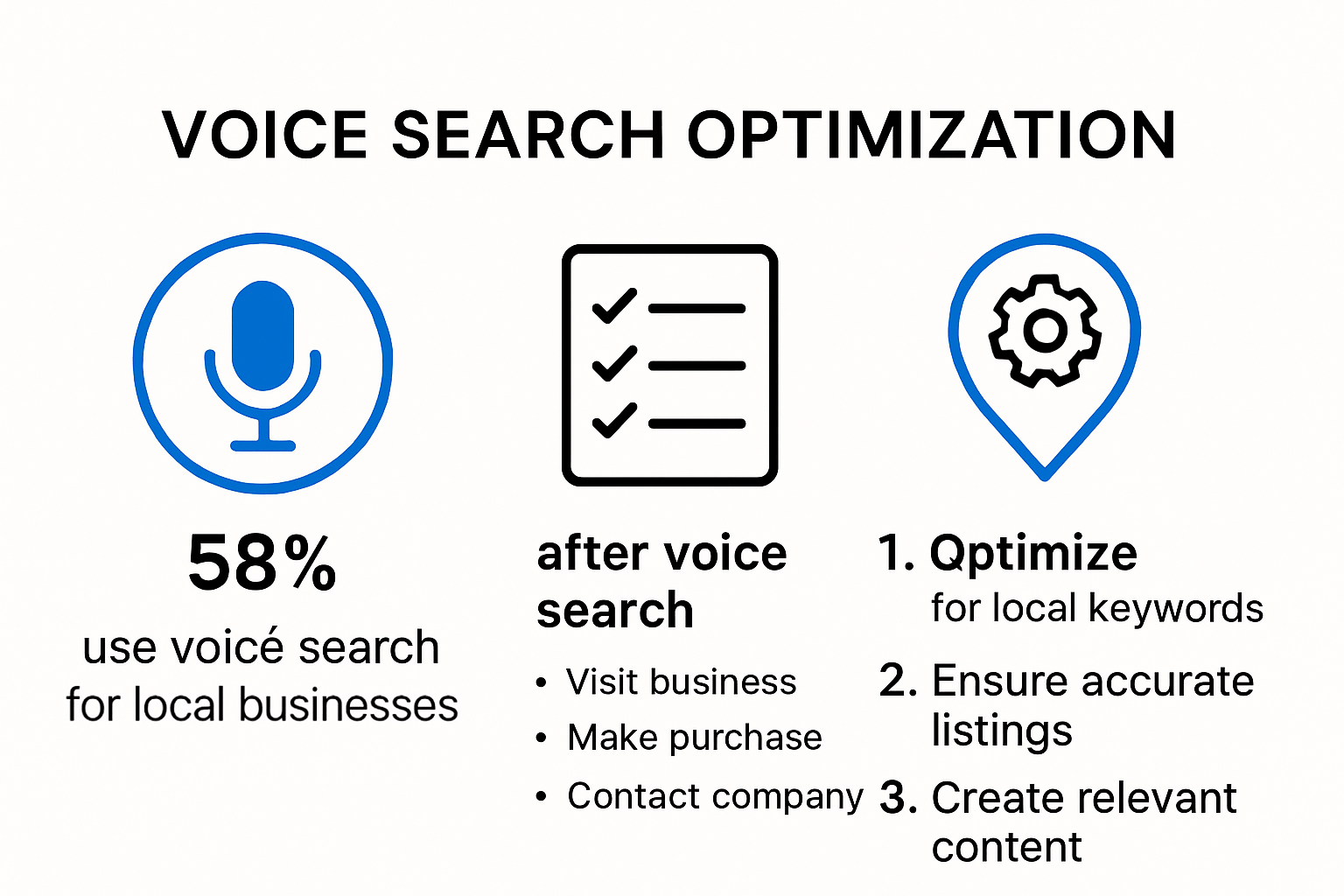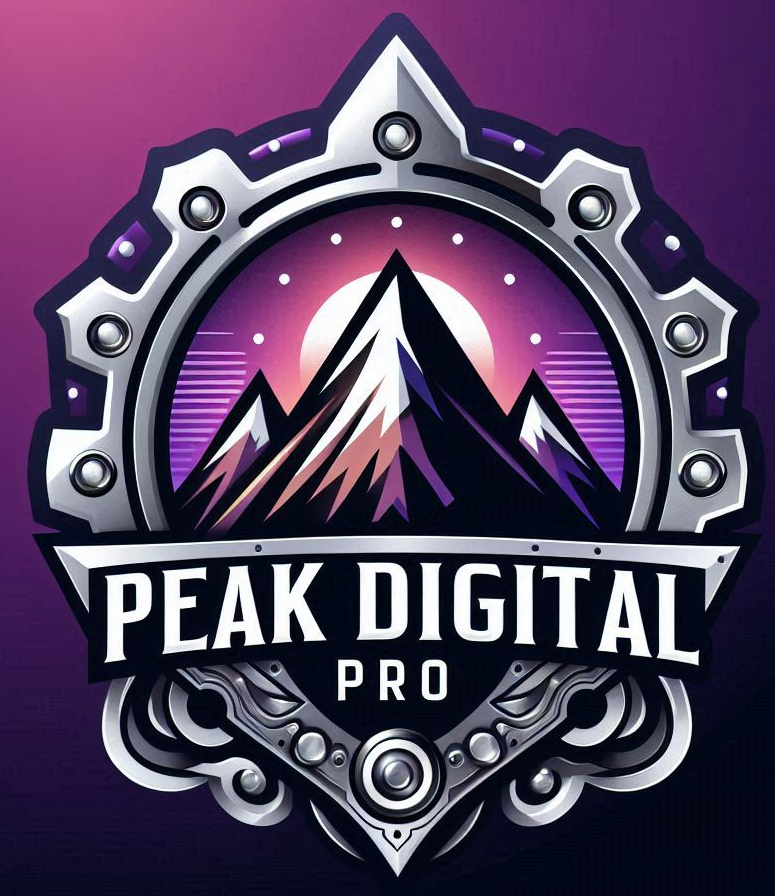Voice Search Optimization for US Business Owners in 2025

Voice search is changing the way local businesses connect with customers. Here is a wild stat to consider: 58% of consumers now use voice search to find local business information . You might think those searches are just quirky modern tech habits. Reality check: nearly a third of these searchers will call a business right after asking their smart device. Voice search is not just convenience. It is fast becoming a main driver of local sales, and businesses who ignore it risk getting left behind.
Table of Contents
Quick Summary
| Takeaway | Explanation |
|---|---|
| Voice Search is Essential for Growth | Voice search optimization is a strategic imperative for local businesses to capture market share and enhance customer engagement in a voice-driven digital landscape. |
| Leverage Conversational Keywords | Businesses should focus on optimizing for natural language and local conversational phrases that align with user queries to improve visibility and interaction. |
| Mobile Optimization is Crucial | With over 60% of voice searches occurring on mobile devices, ensuring fast load times and responsive design is essential for optimizing voice search performance. |
| Avoid Common Optimization Mistakes | Businesses must maintain consistent and accurate information across digital platforms, avoid keyword stuffing, and use user-friendly language to enhance content effectiveness. |
| Implement Technical Best Practices | Successful voice search relies on a strong digital infrastructure, including fast mobile loading, responsive design, and structured data to aid voice assistants in understanding content. |

Why Voice Search Matters for Local Businesses
Voice search is transforming how consumers discover and interact with local businesses. As smart devices become increasingly integrated into daily life, local businesses must understand the critical impact of voice search optimization on their digital presence and customer acquisition strategies.
The Rising Tide of Voice-Enabled Local Searches
Consumer behavior is shifting dramatically with voice technology. Research from Invoca reveals that 58% of consumers now use voice search to find local business information. This statistic is more than just a number – it represents a fundamental change in how people seek out products and services.
The implications for local businesses are profound. When a potential customer asks their smart device, “Where can I find the best coffee shop near me?” or “Which local plumber is available right now?”, businesses optimized for voice search have a significant competitive advantage. These voice-enabled searches are not just random queries – they often translate directly into customer actions.
In fact, data shows that 28% of consumers will call a business immediately after conducting a voice search. This means voice search is not just about visibility – it’s a direct pipeline to customer engagement and potential sales.
Local Discovery Through Smart Devices
Smart speakers and voice-enabled devices are becoming ubiquitous in American households. An astounding 76% of smart speaker users perform local voice searches at least weekly, demonstrating the growing reliance on voice technology for finding nearby businesses.
For local business owners, this trend represents both a challenge and an opportunity. Consumers are increasingly comfortable using natural language to find services. They’re asking conversational questions like “What restaurants are open now?” or “Who offers the best deal on car repairs in my area?”
Businesses that understand and implement voice search optimization can position themselves precisely where these potential customers are looking. This means optimizing not just for traditional keywords, but for conversational phrases and local intent.
Strategic Implications for Business Growth
Voice search optimization is no longer optional – it’s a strategic imperative for local businesses. The technology is moving beyond a novelty and becoming a primary method of information discovery. Businesses that adapt quickly will capture market share, while those who delay risk becoming digitally invisible.
The key is to think like a local consumer using voice search. What questions might they ask? How do they phrase their queries? By aligning your digital presence with these natural language patterns, you create multiple touchpoints for potential customers to discover your business.
Implementing voice search optimization requires a multifaceted approach. This includes updating your Google My Business listing, ensuring consistent local citations, developing content that answers common customer questions, and structuring your website to be voice-search friendly.
The future of local business discovery is conversational, immediate, and voice-driven. Businesses that recognize and embrace this shift will not just survive – they’ll thrive in an increasingly digital marketplace.
Key Voice Search Trends for 2025
As technology continues to evolve, voice search is poised to undergo significant transformations in 2025, reshaping how businesses and consumers interact with digital platforms. Understanding these emerging trends will be crucial for organizations seeking to stay ahead in the rapidly changing digital landscape.
The Rise of Sophisticated Voice Technology
Digital Silk research indicates that smartphones remain the dominant platform for voice search, accounting for 56% of all usage. By 2025, the number of voice assistant users in the United States is projected to reach an impressive 162.7 million, signaling a massive shift in how people access information and services.
The sophistication of voice recognition technology continues to advance rapidly. Natural language processing has become more nuanced, allowing voice assistants to understand context, detect subtle conversational cues, and provide more accurate responses. This means businesses must develop more intelligent, conversational content strategies that mirror how people actually speak.
Interestingly, Seven Atoms research reveals that nearly 50% of Americans now use voice search when shopping, demonstrating the technology’s growing integration into consumer purchasing behaviors.
Economic Impact and Consumer Adoption
The economic implications of voice search are substantial. Global voice shopping spend is projected to reach $81.8 billion in 2025, representing a staggering 322% increase since 2021. This explosive growth indicates that voice search is no longer a novelty but a fundamental component of digital commerce.
Yaguara’s analysis predicts the voice search user count in the United States will hit 153.5 million in 2025. This steady annual increase reflects growing consumer comfort with voice-activated technologies across various devices and platforms.
Consumers are increasingly expecting seamless, intuitive voice interactions. Businesses that can provide personalized, context-aware voice experiences will have a significant competitive advantage. This means developing strategies that go beyond simple keyword matching and focus on understanding user intent.
Emerging Voice Search Optimization Strategies
The 2025 voice search landscape demands a more sophisticated approach to digital marketing. Businesses will need to focus on conversational keywords, local SEO optimization, and creating content that directly answers potential user queries.
Machine learning and artificial intelligence will play a crucial role in refining voice search capabilities. Voice assistants are becoming more adept at understanding user preferences, contextual nuances, and delivering highly personalized results. This means businesses must develop more dynamic, adaptive content strategies.
The most successful organizations will treat voice search not as a separate channel, but as an integrated part of their overall digital strategy. This involves creating content that is easily digestible by voice assistants, optimizing for featured snippets, and ensuring consistent, accurate business information across all digital platforms.
As voice technology continues to evolve, businesses that remain agile, innovative, and user-focused will be best positioned to capitalize on these emerging trends. The future of digital interaction is conversational, intelligent, and increasingly voice-driven.
Actionable Tips to Optimize Your Website
Optimizing your website for voice search requires a strategic approach that goes beyond traditional SEO techniques. In 2025, businesses must adapt their digital presence to meet the evolving demands of voice-enabled search technologies.
Mobile-First Optimization Strategies
Circles Studio research highlights that over 60% of voice searches occur on mobile devices. This statistic underscores the critical importance of mobile optimization for businesses aiming to capture voice search traffic.
Responsive design is no longer optional. Your website must provide a seamless experience across all device types, with fast load times and intuitive navigation. Google’s Core Web Vitals have become a crucial ranking factor, directly impacting your visibility in voice search results. This means focusing on:
- Page Speed : Ensure your website loads quickly on mobile devices
- Mobile Responsiveness : Create a design that adapts perfectly to different screen sizes
- User Experience : Develop an intuitive interface that works smoothly on touch devices
Technical performance matters more than ever. Websites that load in under two seconds and provide a frictionless mobile experience will have a significant advantage in voice search rankings.

Content Optimization for Voice Queries
AIOSEO recommends implementing schema markup as a critical strategy for improving voice search visibility. Structured data helps search engines understand your content more precisely, increasing the likelihood of appearing in voice search results and featured snippets.
The Digital Marketing Institute emphasizes the importance of creating content that answers questions conversationally. Voice assistants prefer content that directly addresses user queries in a natural, spoken language format.
Key strategies include:
- Question-Based Content : Develop content that answers specific user questions
- Natural Language : Write in a conversational tone that mirrors spoken communication
- Comprehensive FAQ Sections : Create detailed FAQ pages with schema markup
Local SEO and Conversational Keywords
Voice search is inherently local and conversational. Businesses must optimize their content to match how people actually speak when searching for local services. This means moving beyond traditional keyword strategies and embracing more natural language patterns.
Prioritize local SEO by:
- Google My Business Updates : Keep your listing current with accurate information
- Local Keywords : Incorporate conversational local search terms
- Location-Specific Content : Create content that speaks directly to local audiences
Voice search optimization is about understanding user intent. It’s not just about matching keywords but providing precise, immediately useful information that voice assistants can quickly retrieve and communicate.
The most successful websites in 2025 will be those that combine technical optimization, conversational content, and a deep understanding of how users interact with voice search technologies. By implementing these strategies, businesses can position themselves at the forefront of this digital transformation.
Common Pitfalls Colorado Businesses Should Avoid
Navigating the complex world of voice search optimization requires strategic awareness and proactive planning. Colorado businesses must understand the potential missteps that can undermine their digital visibility and customer engagement.
Local Search Optimization Mistakes
Simply Be Found research reveals that neglecting location-specific optimization can cause Colorado businesses to be overlooked by voice assistants. Local search is particularly critical for businesses serving specific regions like Denver, Colorado Springs, or Boulder.
Many Colorado businesses make the fundamental error of inconsistent business information across digital platforms. Your Google Business Profile must be meticulously maintained with:
- Accurate Location Details : Precise address and service area
- Current Business Hours : Updated operating times
- Consistent Contact Information : Matching phone numbers and email addresses
Inconsistent or outdated information can confuse voice search algorithms and potentially direct potential customers to competitors who maintain more accurate digital profiles.
Content and Keyword Strategy Errors
Ripe Media analysis highlights that over-optimization and keyword stuffing remain significant pitfalls for businesses attempting voice search optimization. Voice search demands a more nuanced, conversational approach.
Common content mistakes include:
- Rigid Keyword Targeting : Failing to use natural language queries
- Ignoring User Intent : Creating content that doesn’t genuinely answer user questions
- Technical Jargon : Using complex language that doesn’t match spoken communication
The Go To Guy’s research emphasizes the importance of updating website content to reflect evolving voice search intent. Businesses must continuously adapt their content strategy to match how people actually speak and search.
Technical Performance Challenges
Technical limitations can significantly impair voice search performance. Colorado businesses must recognize that voice search optimization goes beyond content – it requires a holistic approach to digital infrastructure.
Key technical pitfalls include:
- Slow Mobile Loading : Websites that don’t perform quickly on mobile devices
- Poor Responsive Design : Interfaces that don’t adapt seamlessly across devices
- Inadequate Schema Markup : Missing structured data that helps voice assistants understand content
Businesses that ignore these technical aspects risk becoming digitally invisible. Voice assistants prioritize websites that provide fast, seamless, and informative experiences.
Successful voice search optimization requires continuous learning and adaptation. Colorado businesses must view this as an ongoing process, not a one-time implementation. By understanding and proactively addressing these common pitfalls, local businesses can position themselves effectively in the evolving voice search ecosystem.
Frequently Asked Questions
What is voice search optimization?
Voice search optimization is the process of enhancing your online content to ensure it is easily discoverable by voice-activated assistants, allowing users to find your business more easily through voice queries.
Why is voice search important for local businesses in 2025?
Voice search is crucial for local businesses because 58% of consumers use it to find local information, and it often leads to immediate customer actions like calls or visits, making it a powerful tool for sales and engagement.
How can I optimize my website for voice search?
To optimize your website for voice search, focus on mobile-first design, use conversational language in your content, implement schema markup for better understanding by search engines, and keep your Google My Business listing updated.
What are common mistakes to avoid in voice search optimization?
Common mistakes include inconsistent business information across platforms, using rigid keywords instead of natural language, over-optimizing content with keyword stuffing, and neglecting the technical performance of your website.
Ready to Capture Local Customers with Next-Level Voice Search?
Business owners everywhere are asking the same urgent question: Will your company show up when a customer asks their smart device for what you offer? The article highlights a real pain point—the risk of getting left behind as voice search takes over local discovery. If you have ever worried about customers missing you because of outdated website content, inconsistent business info, or slow mobile performance, you are not alone. Voice search is powering instant results and phone calls to competitors—unless you act now to get noticed first.

Level up your reach and make your business the go-to answer for voice searches all across Colorado and beyond.
Our team at Peak Digital Pro specializes in advanced SEO optimization and AI-powered marketing strategies tailored for voice-ready success. Schedule your strategy session today at Peak Digital Pro and unlock:
- Web development built for fast, mobile-friendly voice experiences
- Local SEO that puts your business at the top of voice queries
- Trusted digital marketing guidance that delivers measurable growth
Don’t wait as your competitors dominate local voice search. Take the next step and connect with us to win your market!







